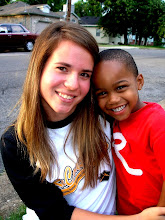 It's no secret that kids can get themselves into trouble. And that some kids get themselves into a little more trouble than others. Most schools these day have "zero-tolerance" policies, which pretty much means one strike and you're out. These policies are usually aimed at keeping violence, drugs, and weapons out of schools. Don't get me wrong, that's a great thing, but these policies sometimes are a little extreme and hardly ever take into account everything contributing to the situation. Severe punishment does not always mean violence or other bad behaviors will stop.
It's no secret that kids can get themselves into trouble. And that some kids get themselves into a little more trouble than others. Most schools these day have "zero-tolerance" policies, which pretty much means one strike and you're out. These policies are usually aimed at keeping violence, drugs, and weapons out of schools. Don't get me wrong, that's a great thing, but these policies sometimes are a little extreme and hardly ever take into account everything contributing to the situation. Severe punishment does not always mean violence or other bad behaviors will stop.In the recent article from The New York Times, Ruling Limits State's Power in School Suspensions, a case is discussed that has changed the administration's rights when it comes to punishing students. In this case, two girls who were fighting at school were suspended and denied access to alternative schooling and tutoring at their home. Due to this case, administrators must now justify their decisions to deprive a student of alternative schooling during suspension.
Do I feel that this is a move in the right direction? Yes. Do I feel that we are there yet? No. I believe that no child should be denied access to alternative schooling no matter whether the administration can come up some reason to justify it or not. Instead, I feel that we need a push for more programs that try to understand why these students are getting into trouble. Kids don't fight just for the fun of it. There are reasons behind their behavior. But instead of trying to help them express their anger and frustration in healthier ways, we severely punish them without taking into consideration why they have acted the way that they have.
An even bigger problem with this is how the children who do get into trouble are deprived the education they deserve. Especially in cases like this, children who cause trouble in schools aren't allowed to get the help they need in order to finish their school work. Have we even considered what this does to a child? Maybe the student in trouble is acting out in order to show his frustration with the difficulties he is already having with his school work. If he or she doesn't have the skills to communicate the problems they are having, acting out may be their cry for help. So, instead of listening to and helping this child, we punish them by putting them even further behind their classmates. I think this an issue that really needs to be looked at in order to find a better solution to helping troubled students succeed.
Colleen Bernard. October 3, 2007. Detention. Retrieved on October 10, 2010 from http://www.flickr.com/photos/binkley27/1486633989/in/photostream/.


No comments:
Post a Comment